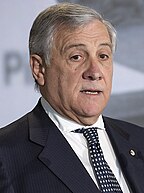
Back Vicepresidente del Consejo de Ministros de Italia Spanish Olaszország miniszterelnök-helyettese Hungarian Vicepresidente del Consiglio dei ministri della Repubblica Italiana Italian Phó Thủ tướng Ý Vietnamese
This article needs additional citations for verification. (October 2022) |
| Vice President of the Council of Ministers of the Italian Republic | |
|---|---|
| Vicepresidente del Consiglio dei Ministri della Repubblica Italiana | |
 | |
| Council of Ministers | |
| Nominator | Prime Minister of Italy |
| Appointer | Council of Ministers[1] |
| Inaugural holder | Palmiro Togliatti |
| Formation | April 24, 1944 |
The deputy prime minister of Italy, officially the vice-president of the Council of Ministers of the Italian Republic (Italian: Vicepresidente del Consiglio dei ministri della Repubblica Italiana), is a senior member of the Italian Cabinet. Moreover, it is often colloquially known as Vicepremier.[2][3] The office of the Deputy Prime Minister is not a permanent position, existing only at the discretion of the Prime Minister, who may appoint to other offices to give seniority to a particular Cabinet minister. The office is currently held by Matteo Salvini and Antonio Tajani under Giorgia Meloni's premiership.
The office is not mentioned in the Constitution. Its role is defined by statutory provisions, most importantly article 8 of law no. 400 of 1998 (Italian: legge n. 400 del 1998). The Deputy Prime Minister assumes the powers of the Prime Minister if the latter becomes unable to discharge his or her duties. In case none was appointed Deputy Prime Minister, it is the eldest Minister who takes upon the role of the Prime Minister in such cases; meanwhile, if there are multiple Deputy Prime Ministers serving at the same time, it falls upon the eldest of them who does so. The Deputy Prime Minister does not automatically succeed the Prime Minister in case the latter resigns, as conventionally, in the aftermath of a resignation, the outgoing Prime Minister remains in place to handle day-to-day business until Parliament picks a successor.
In practice, the designation of someone to the role of Deputy Prime Minister may also provide additional practical status within cabinet, enabling the exercise of de facto, if not de jure, power. In a coalition government, as Enrico Letta Grand coalition government between the Democrats and The People of Freedom, the appointment of the secretary of the smaller party (in the 2014 case, Angelino Alfano, secretary of the PdL) as Deputy Prime Minister is done to give that person more authority within the cabinet to enforce the coalition's agreed-upon agenda.[4]

